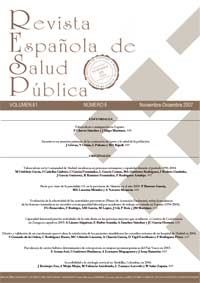The «Instituto de Salud Carlos III» and the Public Health in Spain Origin of Laboratory Medicine and of the Central Laboratories and Research in Public Health
Abstract
The «Instituto de Salud Carlos III» is the Central Public Health Laboratory in Spain with an important component of scientific research in health related areas, such as cancer, cardiovascular diseases, infectious diseases and enviromental health. The article describes the development of the Public Health Institutes, arising from the introduction and development of scientific and laboratory based medicine and the introduction of vaccination and sanitation with the control of water and food. At about the same time, the discoveries in microbiology and immunology were produced, being the research activities incardinated with the practical advances in the control of products. To cope with the practical needs, Institutions were created with the responsibility of providing smallpox vaccine but incorporating very soon production of sera and other vaccines and water and sanitation control and foods control. At the same time, colonization of countries specially in Africa, South East Asia and explorations in Central America confront the Europeans with new diseases and the need of laboratories where to study them. These circumstances gave rise to the birth of the Central Public Health Laboratories and the National Institutes of Health at the beginning of the XX century in many countries. In Spain, the Spanish Civil War was a breaking point in the development of such an institution that finally was reinvented with the creation of the Instituto de Salud Carlos III, in 1986, incorporating research and epidemiological surveillance and control of diseases and also the responsibilities of the Food and Drug Control, lately separated from it.Downloads
Published
2008-03-17
Issue
Section
SPECIALL COLLABORATIONS

